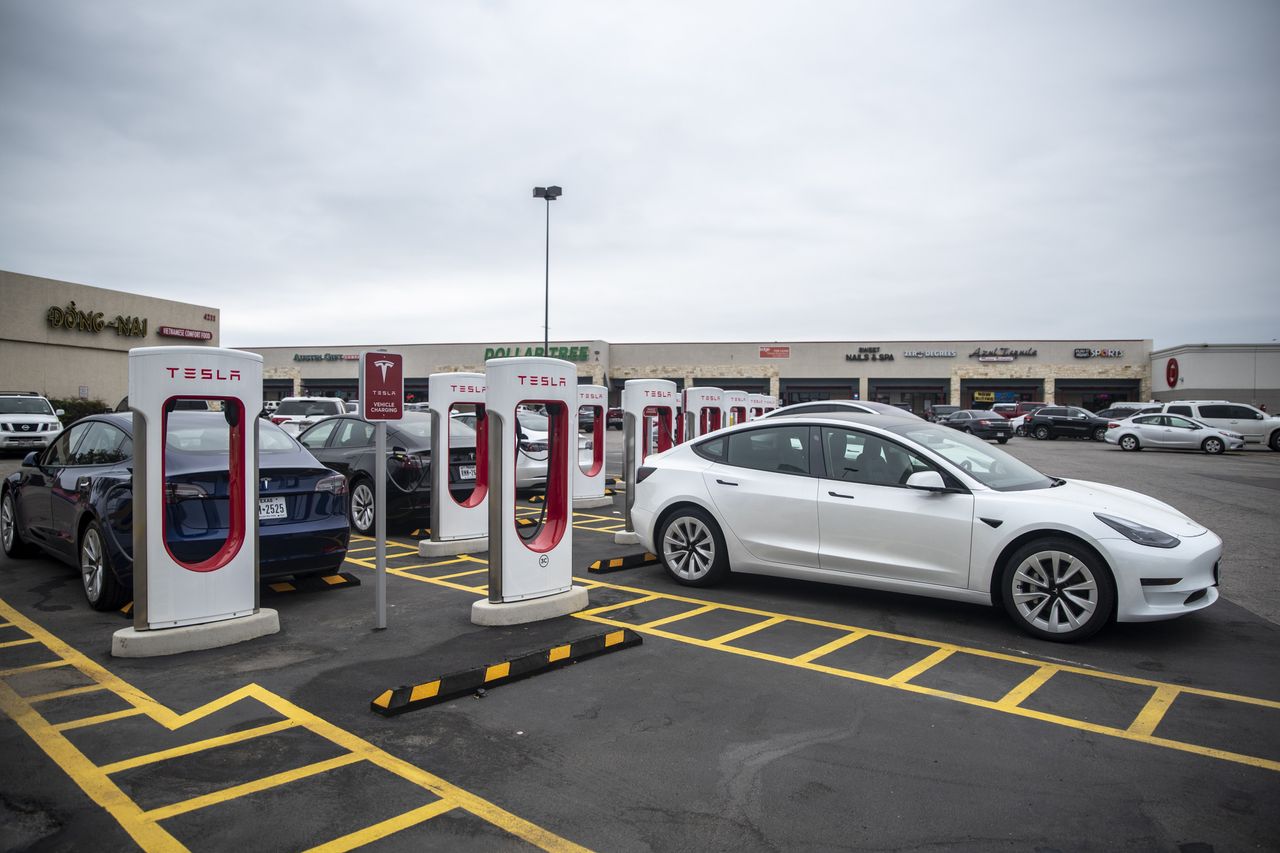EV Tax Credits to Spur More Vehicle Sales Are Entering a Critical Phase
Auto industry pushes Treasury Department to write rules that clearly spell out how electric vehicles can fully qualify, with as much flexibility as a new law allows
The US government is pressing to complete new rules on tax breaks for electric-vehicle purchases by an end-of-year deadline as auto companies seek guidelines that help qualify as many vehicles as possible.
The Treasury Department is leading the effort after the August signing of a law that extended an existing $7,500 tax credit through 2032. The EV plan, included in Democrats’ climate, health and tax-policy package known as the Inflation Reduction Act, included new requirements for U.S. battery sourcing that auto makers have warned will make it difficult for models available today to be eligible.
The changes to the EV tax credits come amid sharp price increases for new vehicles. New-vehicle prices were up 10.1% in August from a year earlier, according to the Labor Department, outpacing the overall annual inflation rate of 8.3%. The average electric-vehicle price is more than $60,000.
EV sales have tripled in the past two years but still account for just 6% of U.S. vehicle sales. Auto companies are pushing to develop and sell more models with goals to greatly increase the percentage of EVs manufactured and sold.
The tax credits are intended to spur electric-vehicle sales and encourage the auto industry to shore up domestic supply chains for materials needed to manufacture EVs. The Biden administration and Democrats see speeding up the pace of U.S.-based production and purchases of electric vehicles as important parts of their broader push to lower greenhouse-gas emissions and address climate change.
The Treasury Department, in its regulatory guidance for the credits, could help make the new requirements easier for auto makers to meet, industry and advocacy groups said. Issues the groups would like to see addressed include how the government calculates whether the sourcing requirements have been met and how auto makers will certify they are in compliance. By law, Treasury must issue guidance for the new requirements by Dec. 31.
Starting in 2023, the law imposes two requirements for an electric vehicle to be eligible for the full tax credit. First, at least 40% of the value of crucial battery minerals such as lithium and nickel must have been extracted or processed in the U.S. or in countries with which the U.S. has a free-trade agreement, or have been recycled in North America. Second, at least 50% of the value of the vehicle’s battery components must have been manufactured or assembled in North America. The percentage thresholds increase in subsequent years.
Dan Bowerson, a senior director at the Alliance for Automotive Innovation, a trade group whose members include several auto makers, said Treasury should issue streamlined guidelines so that auto makers can easily understand the rules as they plan how to meet the requirements.
“We’re going to be pushing for the guidance to be as clear as possible, so that everyone is looking at the same thing,” Mr. Bowerson said. “We don’t want one manufacturer to say, ‘We’re taking the percentage value of the battery components to mean this,’ while the others take it to mean that.”
Tom West, deputy assistant secretary for tax policy at the Treasury Department, said the agency is trying to determine what discretion it has in writing the rules. It is collaborating with other agencies, such as the Energy Department and the Environmental Protection Agency, to understand issues that fall outside of the department’s expertise. He said Treasury is also working to define what constitutes a free-trade agreement for the purposes of tax issues, given the critical-minerals requirements.
“It is a significant challenge, but it is a challenge we are eager to take on because this legislation is something that we’ve been fighting to get for a generation,” Mr. West said about writing the rules.
Auto manufacturers likely will find it challenging to comply with the new rules immediately. The industry has historically been reliant on China and other countries for EV batteries and the processing of minerals that go into them.
Industry and advocacy groups said Treasury should also issue guidance on requirements that go into effect in 2024 and 2025 that make EVs ineligible for the tax credit if they have batteries or critical minerals in batteries that are sourced from a so-called foreign entity of concern, such as China.
“That’s an element of this that needs clarification for sure,” said Genevieve Cullen, president at the trade group Electric Drive Transportation Association. She said members of her group have questions on how the rules would apply when companies are based outside of countries such as China, but have subsidiaries with related EV operations there.
The Alliance for Automotive Innovation has said it would take several years for any EVs now available for purchase in the U.S. to qualify for the full credit, given the new sourcing requirements.
Abigail Wulf, of the Washington-based advocacy group Securing America’s Future Energy, said another question is how Treasury will set calculations for the critical-minerals requirement, because the value of a mineral changes from when it is mined compared with when it is processed. She also said industry likely could meet the battery-component requirements more quickly if the guidance emphasized the manufacturing or assembly location for battery packs—rather than the location of production of battery cells—because many auto makers were just now beginning to increase their domestic facilities for the latter.
 Copyright 2020, Dow Jones & Company, Inc. All Rights Reserved Worldwide. LEARN MORE
Copyright 2020, Dow Jones & Company, Inc. All Rights Reserved Worldwide. LEARN MORE
This stylish family home combines a classic palette and finishes with a flexible floorplan
Just 55 minutes from Sydney, make this your creative getaway located in the majestic Hawkesbury region.
As Paris makes its final preparations for the Olympic games, its residents are busy with their own—packing their suitcases, confirming their reservations, and getting out of town.
Worried about the hordes of crowds and overall chaos the Olympics could bring, Parisians are fleeing the city in droves and inundating resort cities around the country. Hotels and holiday rentals in some of France’s most popular vacation destinations—from the French Riviera in the south to the beaches of Normandy in the north—say they are expecting massive crowds this year in advance of the Olympics. The games will run from July 26-Aug. 1.
“It’s already a major holiday season for us, and beyond that, we have the Olympics,” says Stéphane Personeni, general manager of the Lily of the Valley hotel in Saint Tropez. “People began booking early this year.”
Personeni’s hotel typically has no issues filling its rooms each summer—by May of each year, the luxury hotel typically finds itself completely booked out for the months of July and August. But this year, the 53-room hotel began filling up for summer reservations in February.
“We told our regular guests that everything—hotels, apartments, villas—are going to be hard to find this summer,” Personeni says. His neighbours around Saint Tropez say they’re similarly booked up.
As of March, the online marketplace Gens de Confiance (“Trusted People”), saw a 50% increase in reservations from Parisians seeking vacation rentals outside the capital during the Olympics.
Already, August is a popular vacation time for the French. With a minimum of five weeks of vacation mandated by law, many decide to take the entire month off, renting out villas in beachside destinations for longer periods.
But beyond the typical August travel, the Olympics are having a real impact, says Bertille Marchal, a spokesperson for Gens de Confiance.
“We’ve seen nearly three times more reservations for the dates of the Olympics than the following two weeks,” Marchal says. “The increase is definitely linked to the Olympic Games.”

Getty Images
According to the site, the most sought-out vacation destinations are Morbihan and Loire-Atlantique, a seaside region in the northwest; le Var, a coastal area within the southeast of France along the Côte d’Azur; and the island of Corsica in the Mediterranean.
Meanwhile, the Olympics haven’t necessarily been a boon to foreign tourism in the country. Many tourists who might have otherwise come to France are avoiding it this year in favour of other European capitals. In Paris, demand for stays at high-end hotels has collapsed, with bookings down 50% in July compared to last year, according to UMIH Prestige, which represents hotels charging at least €800 ($865) a night for rooms.
Earlier this year, high-end restaurants and concierges said the Olympics might even be an opportunity to score a hard-get-seat at the city’s fine dining.
In the Occitanie region in southwest France, the overall number of reservations this summer hasn’t changed much from last year, says Vincent Gare, president of the regional tourism committee there.
“But looking further at the numbers, we do see an increase in the clientele coming from the Paris region,” Gare told Le Figaro, noting that the increase in reservations has fallen directly on the dates of the Olympic games.
Michel Barré, a retiree living in Paris’s Le Marais neighbourhood, is one of those opting for the beach rather than the opening ceremony. In January, he booked a stay in Normandy for two weeks.
“Even though it’s a major European capital, Paris is still a small city—it’s a massive effort to host all of these events,” Barré says. “The Olympics are going to be a mess.”
More than anything, he just wants some calm after an event-filled summer in Paris, which just before the Olympics experienced the drama of a snap election called by Macron.
“It’s been a hectic summer here,” he says.

AFP via Getty Images
Parisians—Barré included—feel that the city, by over-catering to its tourists, is driving out many residents.
Parts of the Seine—usually one of the most popular summertime hangout spots —have been closed off for weeks as the city installs bleachers and Olympics signage. In certain neighbourhoods, residents will need to scan a QR code with police to access their own apartments. And from the Olympics to Sept. 8, Paris is nearly doubling the price of transit tickets from €2.15 to €4 per ride.
The city’s clear willingness to capitalise on its tourists has motivated some residents to do the same. In March, the number of active Airbnb listings in Paris reached an all-time high as hosts rushed to list their apartments. Listings grew 40% from the same time last year, according to the company.
With their regular clients taking off, Parisian restaurants and merchants are complaining that business is down.
“Are there any Parisians left in Paris?” Alaine Fontaine, president of the restaurant industry association, told the radio station Franceinfo on Sunday. “For the last three weeks, there haven’t been any here.”
Still, for all the talk of those leaving, there are plenty who have decided to stick around.
Jay Swanson, an American expat and YouTuber, can’t imagine leaving during the Olympics—he secured his tickets to see ping pong and volleyball last year. He’s also less concerned about the crowds and road closures than others, having just put together a series of videos explaining how to navigate Paris during the games.
“It’s been 100 years since the Games came to Paris; when else will we get a chance to host the world like this?” Swanson says. “So many Parisians are leaving and tourism is down, so not only will it be quiet but the only people left will be here for a party.”
This stylish family home combines a classic palette and finishes with a flexible floorplan
Just 55 minutes from Sydney, make this your creative getaway located in the majestic Hawkesbury region.






















